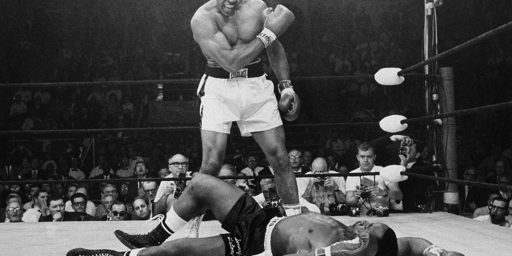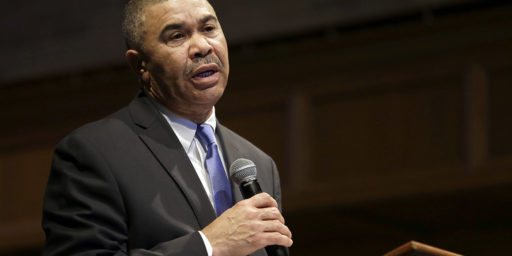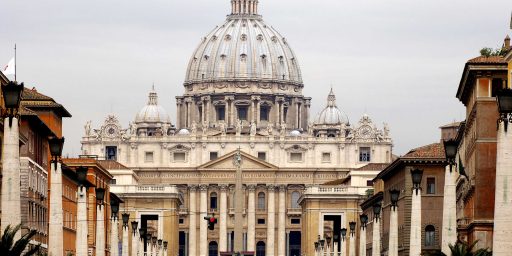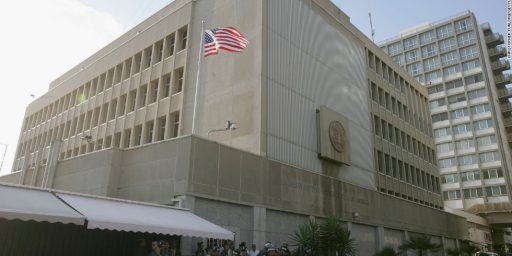State Department Bought $70,000 Worth of Obama Biographies
Barack Obama wrote two bestselling memoirs before becoming president. Both of them are hot items at Foggy Bottom.
Barack Obama wrote two bestselling memoirs before becoming president. Both of them are hot items at Foggy Bottom.
Washington Times (“State Department buys $70,000 worth of Obama books“):
The State Department has bought more than $70,000 worth of books authored by President Obama, sending out copies as Christmas gratuities and stocking “key libraries” around the world with “Dreams From My Father” more than a decade after its release.
The U.S. Embassy in Egypt, for instance, spent $28,636 in August 2009 for copies of Mr. Obama’s best-selling 1995 memoir. Six weeks earlier, the embassy had placed another order for the same book for more than $9,000, federal purchasing records show.
About the same time, halfway around the world, the U.S. Embassy in South Korea had the same idea and spent more than $6,000 for copies of “Dreams From My Father.”
One month later, the U.S. Embassy in Jakarta, Indonesia, spent more than $3,800 for hardcover copies of the Indonesian version of Mr. Obama’s “The Audacity of Hope,” records show.
This is rather unusual–unprecedented, actually–an is raising some eyebrows.
A review of the expenditures in a federal database did not reveal any examples of State Department purchases of books by former Presidents George W. Bush or Bill Clinton. The purchases of Mr. Obama’s literary work mostly, but not always, took place in the months after Mr. Obama captured the White House.
Leslie Paige, a spokeswoman for Citizens Against Government Waste, a watchdog group, said if the federal government is looking to cut costs, eliminating purchases of Mr. Obama’s books is a good place to start.”It’s inappropriate for U.S. taxpayer dollars to be spent on this,” she said. “This sounds like propaganda.”
Given the Washington Times’ reputation, one should naturally be a bit skeptical of stories seeming to attack a Democratic president. But the facts aren’t in dispute here:
But State Department spokesman Noel Clay said the book purchases followed regular government procurement rules. He said diplomats have long used books as a way to help broker talks on important foreign-policy matters. “The structure and the presidency of the United States is an integral component of representing the United States overseas,” Mr. Clay said. “We often use books to engage key audiences in discussions of foreign policy.” He also said books are purchased to stock the State Department’s “information resource centers,” which he said are located around the world and provide books about U.S. coverage of issues such as culture, history and values. “We also provide key library collections with books about the United States,” he said.
That’s actually a pretty lame explanation. Reading books about a just-out-of-law-school prodigy’s wistful reflections on an absent father don’t shed much light on the institutions of the US Government. Then again, these books may well be quite useful in promoting US interests in Africa and the Pacific. After all, the previous 42 occupants of the White House (Grover Cleveland gets counted twice in the enumeration of presidents, but he was just one man) were white guys. The story of a mixed race child with one African parent who spent his formative years in Indonesia and Hawaii and rose to the American presidency is presumably of especial interest in those parts of the world.
And this is quite important:
There’s no indication the White House knew about the purchases, which overall represent just a fraction of the nearly quarter-million dollars Mr. Obama donated to charities last year and his more than $1.7 million in overall income. Mr. Clay said book orders are normally made directly by embassies based on “their experience and knowledge on the ground of the intended audience.”
Obama became a very wealthy man before assuming the presidency, largely on the sales of these two books. His share of $70,000 in sales–presumably, at a highly discounted government rate–wouldn’t even be noticed in his bank account. It’s inconceivable that he’s trying to line his pockets by ordering embassies to buy up wildly popular books. (This is different than well publicized cases of Congressmen writing “books” that got “sold” in mass quantities to lobbying groups as a means of circumventing gift laws back in the 1990s.)
This is an odd story but not a scandal.






I’m not dazzled or confused by this. Obama’s presidency is ground-breaking on several fronts and giving a global audience an idea of who he is isn’t propaganda in the bad sense. Feeding the curiosity of citizens of other countries–including those who continue to see the US as the most racist society ever–has its own multifarious benefits.
In my career, I would frequently be responsible for order books for both the local cultural center/library and for distribution. Giving someone a book is still seen as a nice gesture in most of the world, even if it’s lost its cachet in the US. We wouldn’t hand out best sellers for the most part, but classics of American Lit were commonly distributed to individuals, schools, and local libraries (which always had inadequate funds for acquisition).
The real problem with books was when headquarters (or their boss) decided that a particular title just needed to be given global distribution. That happened rarely, but was always a waste of time, money, and effort. When the individual posts were doing the deciding, it was because they knew best what messages were needed or desired for the local audiences.
I will note that the now-defunct US Information Agency put most of its decision-making authority in the field, not at headquarters. State works rather differently.
“This sounds like propaganda.”
Well, duh — that’s exactly what it is. Propaganda in our favor for Third World consumption.
What John Burgess said.
Good input, Mr. Burgess. I guess I’d only be concerned about this if it was ordered at a high level, which it doesn’t appear to be.
I guess there wasn’t sufficient demand for the treatise on paint drying that was published by the Watching Grass Grow Coalition. Oh, well.